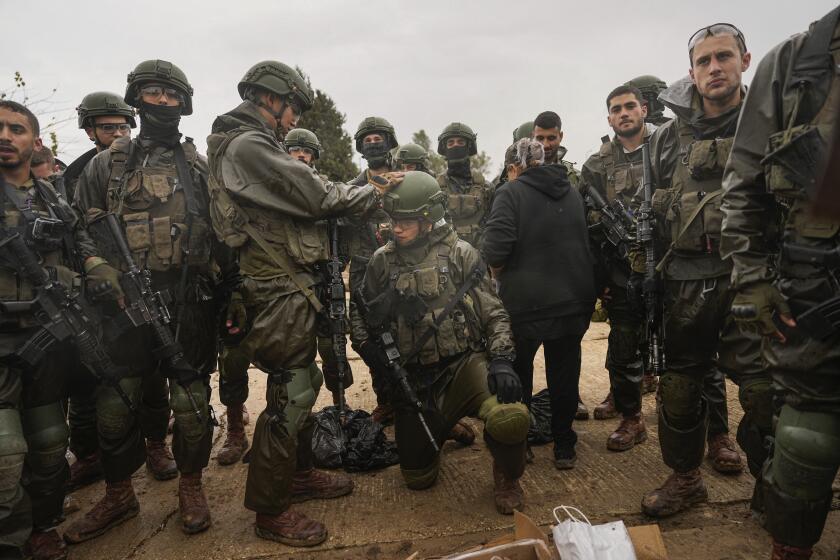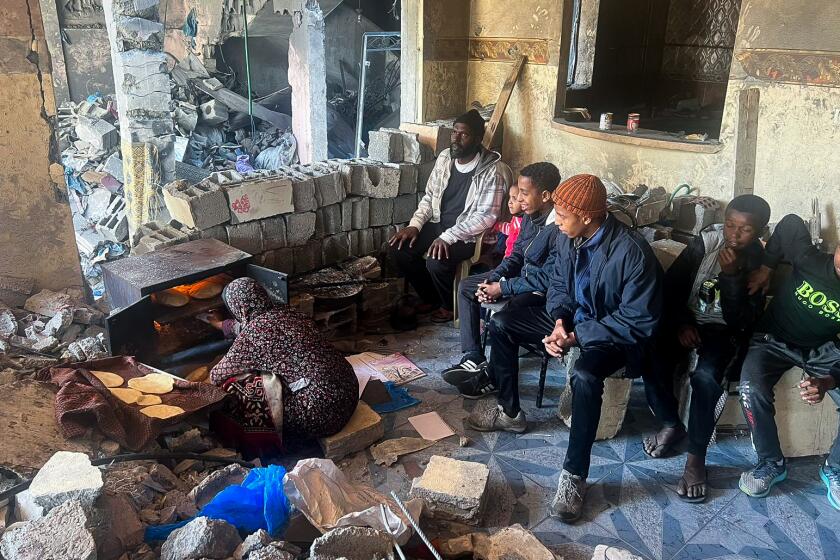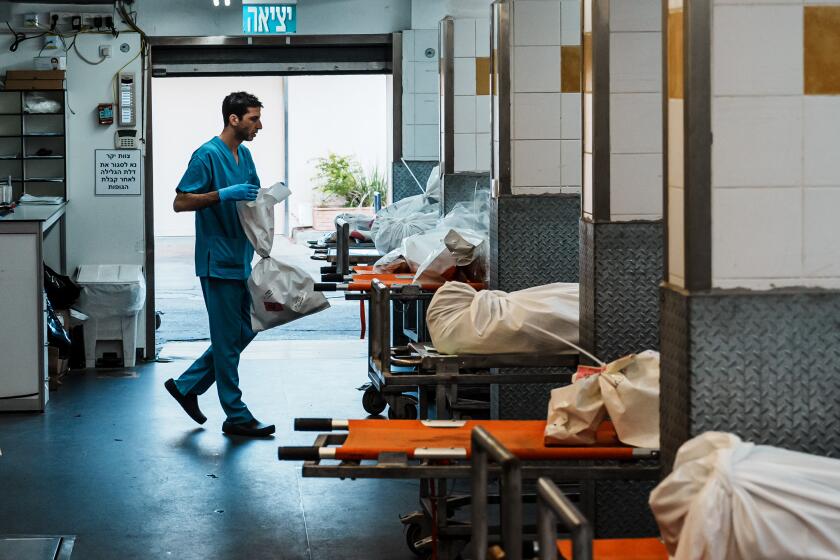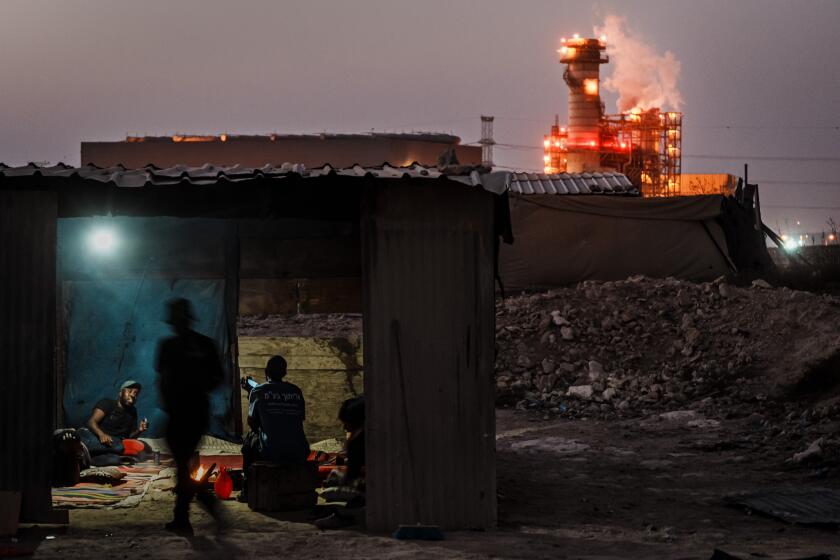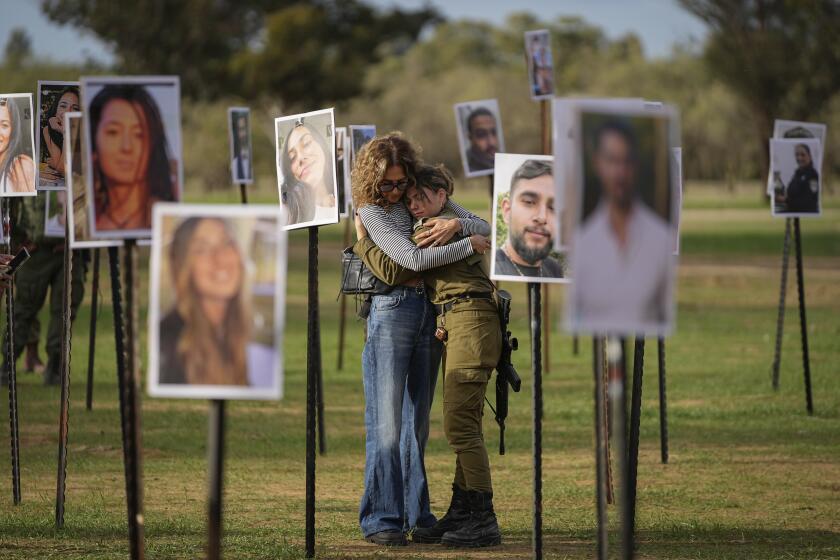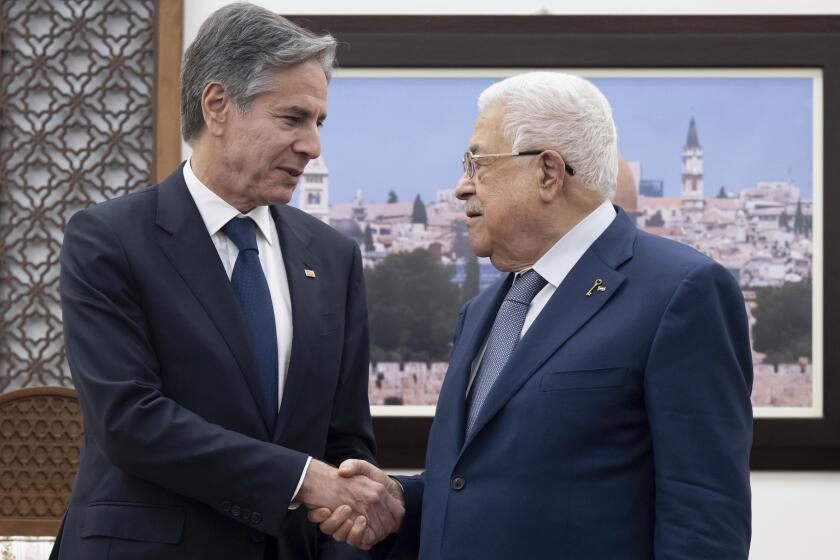Israeli military says it mistakenly killed 3 Israeli hostages in Gaza
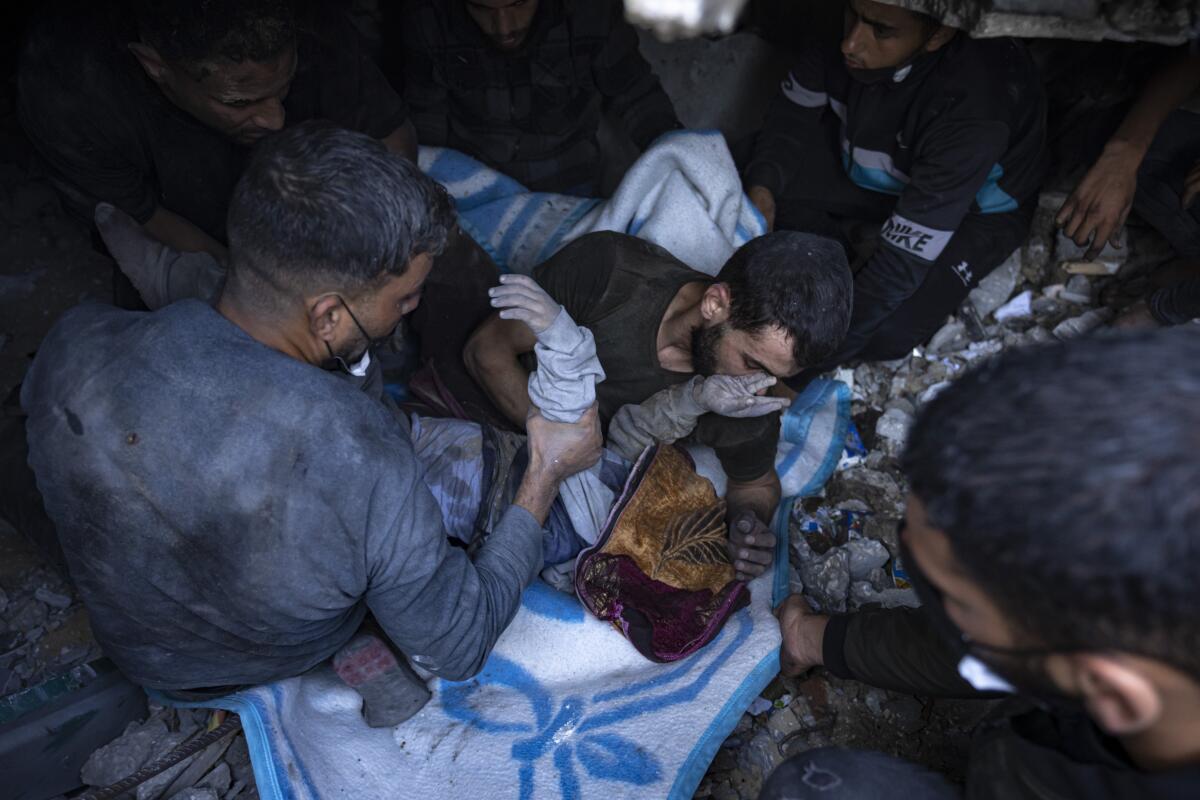
- Share via
RAFAH, Gaza Strip — Israeli troops Friday mistakenly shot to death three Israeli hostages in a battle-torn neighborhood of Gaza City. Meanwhile, an Israeli strike killed a Palestinian journalist in the south of the besieged territory.
The deaths underscore the ferocity of Israel’s onslaught in Gaza, as a U.S. envoy was trying to persuade the Israelis to scale back their campaign.
The hostages were killed in the Gaza City area of Shajaiya, where troops have been engaged in fierce fighting with Hamas militants. The soldiers mistakenly identified the three Israelis as a threat and opened fire on them, according to the army’s chief spokesman, Rear Adm. Daniel Hagari. He said it was believed that the three had either fled their captors or been abandoned.
“Perhaps in the last few days, or over the past day — we still don’t know all the details — they reached this area,” Hagari said. He said the army expressed “deep sorrow” and was investigating.
Hamas and other militants abducted more than 240 people in the Oct. 7 attack on southern Israel that triggered the war, and the hostages’ plight has dominated public discourse ever since. Demonstrations in solidarity with the hostages and their families take place nearly every day. Late Friday, hundreds of protesters blocked Tel Aviv’s main highway in a spontaneous demonstration calling for the hostages’ return. Israeli political and military leaders often say that freeing all the hostages is their top aim in the war, alongside destroying Hamas.
Still, in the seven weeks since ground troops pushed into northern Gaza, they have not rescued any hostages, though they freed one early in the conflict and have found the bodies of several. Hamas last month released more than 100 in swaps for Palestinian prisoners, and more than 130 are believed to remain in captivity.
The hostages mistakenly killed Friday were identified as men who had been abducted from Israeli communities near the Gaza border: Yotam Haim, 28; Samer Al-Talalka, 25; and Alon Shamriz, 26.
Prime Minister Benjamin Netanyahu called the deaths an “unbearable tragedy,” vowing to continue “with a supreme effort to return all the hostages home safely.”
In southern Gaza, the satellite channel Al Jazeera said an Israeli strike Friday in the city of Khan Yunis killed cameraman Samer Abu Daqqa and wounded the outlet’s chief correspondent in Gaza, Wael Dahdouh. The two were reporting at a school that had been hit by an airstrike when a drone launched a second strike, the channel said.
Speaking from a hospital bed, Dahdouh told Al Jazeera that he managed to walk to an ambulance. Dahdouh, whose wife and children were killed by an Israeli strike earlier in the war, was wounded by shrapnel in his right arm.
But Abu Daqqa lay bleeding in the school and died hours later. An ambulance that tried to reach him had to turn back because roads were blocked by rubble, Al Jazeera said.
Before Abu Daqqa’s death, the Committee to Protect Journalists reported that at least 63 journalists had been killed in the war: 56 Palestinians, four Israelis and three Lebanese.
In other news, Israel said Friday that it was opening a military police investigation after an Israeli human rights group posted videos that appeared to show Israeli troops killing two Palestinians — one who was incapacitated and the other unarmed — during a military raid in a West Bank refugee camp. The B’Tselem human rights group accused the army of carrying out a pair of “illegal executions.”
The security-camera videos appear to show two Israeli military vehicles pursuing a group of Palestinians in the Faraa refugee camp in the northern West Bank. One man, who appears to be holding a red canister, is gunned down by soldiers; B’Tselem identified the man as Rami Jundob, 25. A military jeep then approaches Jundob as he lies on the ground bleeding, and soldiers fire at him until he is still. Soldiers then approach a man identified by B’Tselem as Thaar Shahin, 36, as he cowers beneath the hood of a car. They shoot him from close range.
Israel’s Gaza offensive — triggered by the attack onIsrael in which Hamas militants killed at least 1,200 people, mostly civilians — has flattened much of northern Gaza and driven 80% of the territory’s population of 2.3 million from their homes.
The offensive has killed more than 18,700 Palestinians, according to the Hamas-run Health Ministry in Gaza. Thousands more are missing and feared dead beneath the rubble.
The U.S. and Israel have discussed a timetable for scaling back intense combat operations in the war against Hamas, though they agree that the fight will take months, an envoy said Friday, amid growing U.S. unease about the mounting death toll in Gaza.
U.S. national security advisor Jake Sullivan met with Palestinian Authority President Mahmoud Abbas to discuss the enclave’s postwar picture, which couldinclude bringing back Palestinian security forces driven from Gaza by Hamas in its 2007 takeover, according to a senior U.S. official.
American and Israeli officials have been vague in public about how Gaza will be run if Israel achieves its goal of ending Hamas’ control — and the idea, floated as one of several, appeared to be the first time Washington offered some detail on its vision for security arrangements in the enclave.
Any role for Palestinian security forces in Gaza is bound to elicit strong opposition from Israel, which seeks to maintain an open-ended security presence there and says it won’t allow a postwar foothold for the Palestinian Authority, which administers parts of the Israeli-occupied West Bank but is deeply unpopular with Palestinians.
After Hamas’ attack, the U.S. pledged full support for Israel. Now, as the death toll in Gaza skyrockets, President Biden is trying to rein in Netanyahu.
Israeli Defense Minister Yoav Gallant told Sullivan it would take months to destroy Hamas but did not say whether his estimate referred to the current phase of heavy airstrikes and ground battles.
Sullivan said Friday that he discussed a timeline with Netanyahu and Israel’s war Cabinet and that such conversations would continue during an upcoming visit by U.S. Defense Secretary Lloyd J. Austin III.
‘I just don’t know where we’ll go.’ It’s a question Palestinians ask over and over in Gaza as Israel ramps up bombardment after Hamas truce collapsed.
President Biden’s administration has expressed unease over Israel’s failure to reduce civilian casualties and its plans for the future of Gaza, but the White House continues to offer wholehearted support for Israel with weapons shipments and diplomatic backing.
“I want them to be focused on how to save civilian lives,” Biden said Thursday when asked whether he wants Israel to scale down its combat operations by the end of the month. “Not stop going after Hamas, but be more careful.”
A forensic investigator in Tel Aviv works to reassemble remains of victims of Hamas militants, trying to understand the causes of death and the underlying cruelty.
A deadly Hamas ambush on Israeli troops in Gaza City this week showed the group’s resilience and called into question whether Israel can defeat it without wiping out the entire territory.
Israeli airstrikes and tank shelling continued Thursday night into Friday, including in the southern city of Rafah, part of the shrinking areas of densely populated Gaza to which Palestinian civilians had been told by Israel to evacuate. At least one person was killed, according to an Associated Press journalist who saw the body arriving at a local hospital.
Bedouins of the Negev desert face rockets from Gaza and discrimination and arrest by Israel. They seek safety as the war energizes the far right.
As the Palestinian militant group Hamas frees more hostages amid a temporary truce with Israel, a harrowing glimpse of captivity in war-torn Gaza emerges.
A deadly Hamas ambush on Israeli troops in Gaza City this week showed the group’s resilience and called into question whether Israel can defeat it without wiping out the entire territory.
Israeli airstrikes and tank shelling continued Thursday night into Friday, including in the southern city of Rafah, part of the shrinking areas of densely populated Gaza to which Palestinian civilians had been told by Israel to evacuate. At least one person was killed, according to an Associated Press journalist who saw the body arriving at a local hospital.
The Biden administration views the two-state solution — an independent Palestinian state alongside Israel — as the only way to stop generations of violence.
Palestinian officials have said they will consider a postwar role in Gaza only in the context of concrete U.S.-backed steps toward Palestinian statehood.
The Palestinian Authority prime minister said it’s time for the United States to deal more firmly with Israel, particularly on calls fornegotiations for a two-state solution to the Israeli-Palestinian conflict.
“Now that the United States has talked the talk, we want Washington to walk the walk,” Mohammed Shtayyeh said Thursday. “If the United States cannot deliver Israel, who can?”
In another postwar scenario, Washington has called for revitalizing the Palestinian Authority, without letting on whether such reforms would require personnel changes or general elections, which last took place 17 years ago.
The 88-year-old Abbas is deeply unpopular. A poll published Wednesday indicated that close to 90% of Palestinians want him to resign. Meanwhile, Palestinian support for Hamas has tripled in the West Bank, with a small uptick in Gaza, according to the poll. Still, a majority of Palestinians do not back Hamas, according to the survey.
Laub reported from Ramallah, West Bank; Jobain from Rafah, Gaza Strip; and Mroue from Beirut. Associated Press journalists Aamer Madhani in Washington, Julia Frankel in Jerusalem and Elena Becatoros in Athens contributed.
More to Read
Sign up for Essential California
The most important California stories and recommendations in your inbox every morning.
You may occasionally receive promotional content from the Los Angeles Times.
